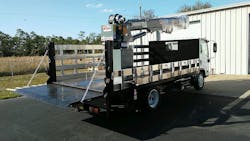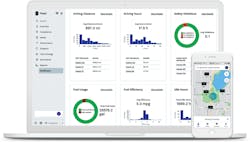KCL Plumbing: Success Through Asset Management
PALM BEACH, FL — For the past ten years, KCL Plumbing has served the needs of its residential and commercial customers in Palm Beach, Broward and Martin County. The business is owned and operated by Kevin Lesiak, and two years ago he brought in his father, Alex Lesiak, to work as his Fleet Manager.
“It’s mostly new construction/remodeling,” Alex Lesiak explains. “We do have a service department, but that’s only about 20 percent of the business. 70-80 percent is all new construction, remodeling and commercial work.” The company has 36 numbered trucks with 36 currently in operation, and approximately 60 employees.
Alongside the plumbing work, KCL does a lot of gas installations. That means not only specially dedicated and certified technicians, but also a lot of specialized equipment. Some of that equipment is part of the company’s fleet, including a four-ton crane to move tanks around and a multi-purpose vehicle that combines a flatbed with a crane. The company has found plumbing and gas to be a natural (and profitable) combination. “Down here a lot of people install LP tanks and run everything from there,” Alex Lesiak says.
Business has been “off the hook,” according to Lesiak. “Right now the company is in a position where there’s so much work that’s actually not under contract but being bid, that we’re at a shortage of manpower… if experienced men showed up, if they’re qualified, they would most likely be hired on the spot.”
For a combination of reasons, the ongoing coronavirus pandemic has not slowed business at all, as far as Lesiak can tell. “We’ve been very fortunate,” he says. “The counties and the cities that we do the majority of work in, all the construction sites are open.” In the event of service calls, KCL is considered (along with most of the trades) an essential service. While there is a widely enforced curfew in Palm Beach county, most trades are given some leeway by officials.
KCL is not taking its good luck for granted and is doing all it can to keep its employees and customers safe. “We’re taking precautions in-house,” Lesiak says, sanitizing the warehouse, the office space as well as the trucks and fueling station. “Fortunately for us, the men are healthy. It appears no one has gotten sick—that’s a blessing, that’s fantastic—and the operation is running very smoothly.”
Naturally, KCL’s business model is dependent upon its vehicles. About two years ago Kevin Lesiak began to wonder if he was getting the most out of his fleet. That’s when he brought in his father, Alex. “One of the things Kevin tasked me with was to go out and see what the market had and see if we could upgrade the system.”
Lesiak set up a side-by-side comparison of three different systems. All three provided free, 30-day trials at no cost to the company. Eventually, for a number of reasons, KCL Plumbing decided to switch to Samsara, an all-in-one management solution, for its fleet. They’ve been using it for the past 19 months.
For Alex Lesiak, one feature of the new system that really sold him was the real-time tracking. Under the old system there could be a lag from 30 seconds to a full minute. Under the new, “when you expand the map of your fleet on the dashboard, when you’d start tracking one [vehicle] versus another, you could see the actual vehicles moving along, pretty much in real time and almost the exact location.”
One of Lesiak’s watchwords as a fleet manager is “accountability,” and the system lets him know at any given time where any vehicle is. And the system provides the tools he needs to document and verify locations.
“One feature I really do like,” Lesiak says, “once a truck actually parks somewhere and shuts itself off it takes a snapshot. It takes a snapshot immediately when you start the truck up again. And then, because we have the dash cameras, we can pull the video whenever we need it.” If there’s ever a dispute with a contractor or a builder, KCL can quickly and easily prove where its people were at any given time.
The Samsara system is also a huge help when it comes to handling maintenance. When Lesiak clocks in each morning, right after he checks his email, he pulls up the system and clicks on the maintenance icon. “Everything is pre-set,” he says. “I can see exactly the status just by a glance at the dashboard.”
Lesiak can see what’s new, what needs to be scheduled, what’s getting ready to come up for maintenance, reoccurring maintenance, preventative maintenance, all broken out by whatever he wants to see.
On the administrative side, KCL has begun using Samsara to do payroll. It makes it easy to track workers when they are on specific projects. They know who is on which truck every day, from the time they enter the job site to when they leave—which all comes back to that watchword, “accountability.” “The more we use the system,” Lesiak says, “the more new ways we find of using it.”
That accountability extends to the behind-the-wheel behavior of drivers. Through the system, managers can get actual data—including video—of behaviors such as harsh breaking, hard turning, sudden acceleration and more. For Lesiak (a big supporter of the first amendment), that data is for understanding the specifics of given incident, not for a sword to hang over his drivers’ heads.
“We didn’t buy this tool to be Big Brother,” he says. “If a harsh incident does occur, you pull it up, and the majority of the time when I view that piece of video I’m finding the driver is vindicated.”
One final aspect of the system that sold Lesiak on Samsara was the customer service the company provided. Whenever a glitch has come up, they’ve taken care of it right away. Lesiak has had conversations with all three of the Samsara call centers at all times of the day and night and they have been, he says, universally very accommodating.
Lesiak has special appreciation for his rep, Alyssa Unterreiner, Senior Account Executive – Strategic Accounts at Samsara, who was his point of contact while he was comparing various systems. “Sure,” he says, “she asked for our business, and she eventually asked us to make a decision, but there wasn’t this high-pressure sales pitch as we were going through the process of evaluation… she gave us multiple systems so we could test several different types of vehicles with the equipment.”
About the Author
Steve Spaulding
Editor-in-Chief - CONTRACTOR
Steve Spaulding is Editor-in-Chief for CONTRACTOR Magazine. He has been with the magazine since 1996, and has contributed to Radiant Living, NATE Magazine, and other Endeavor Media properties.



